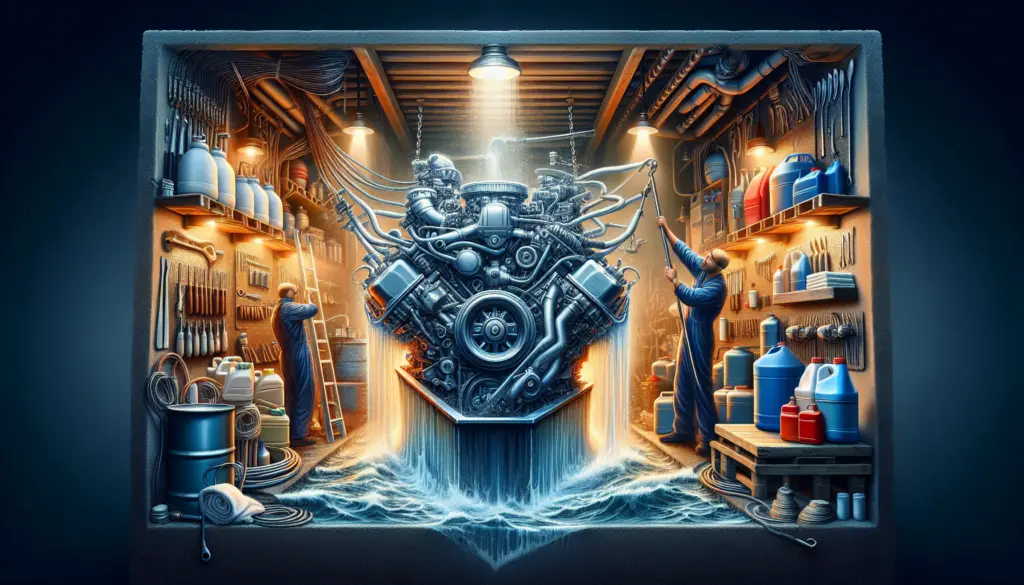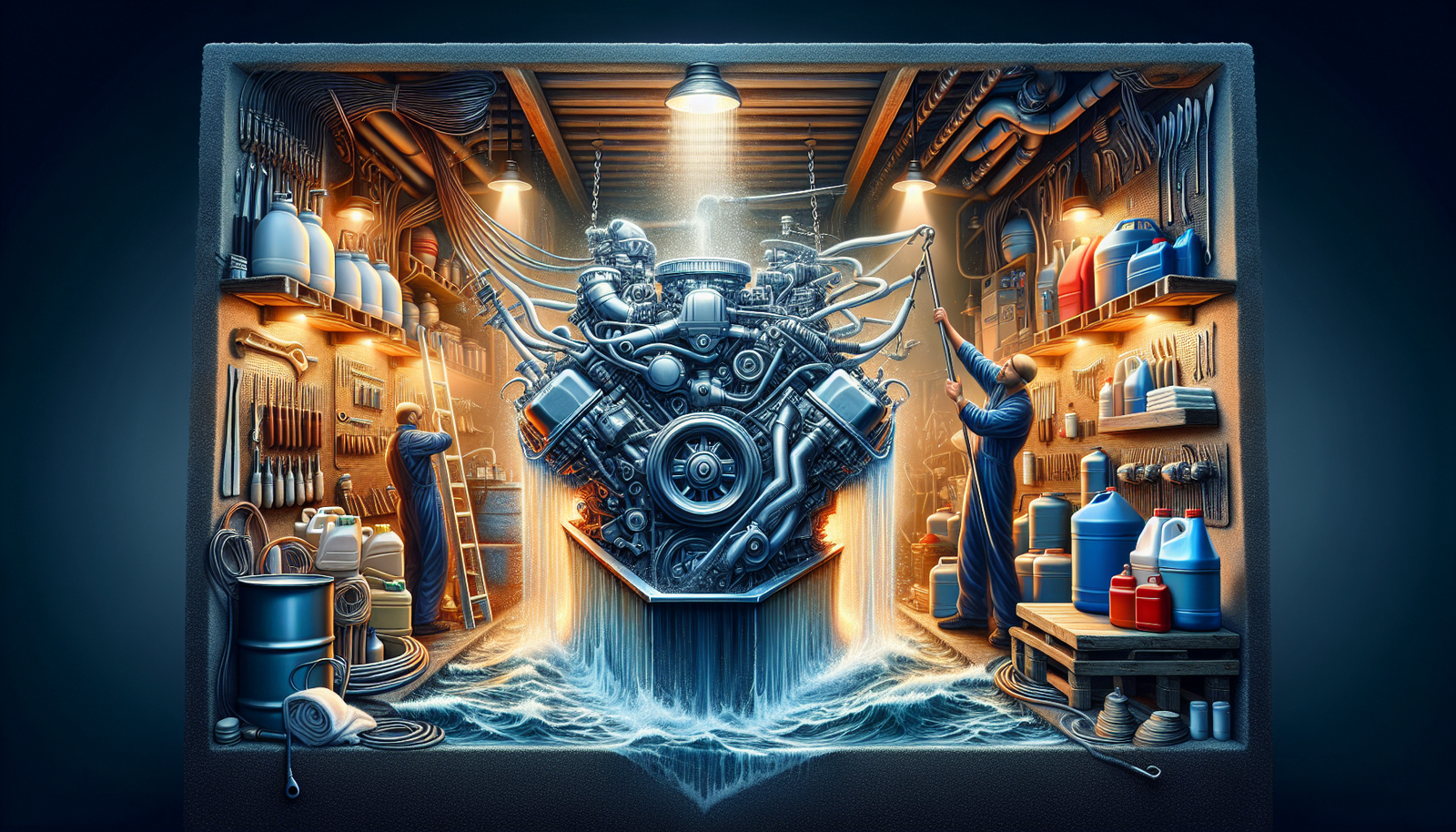As a boat owner, you know the excitement surrounding the season of sailing and the tranquility of the open water. Yet, the off-season brings its own set of hurdles, such as the proper storage of your boat engine. If neglected, this situation could lead to undesirable damages and costly repairs. The article “How to Properly Store Your Boat Engine During the Off-Season” helps you navigate these waters by providing straightforward, easy-to-follow instructions that ensure your boat engine stays in top-notch condition even through the coldest of winters. Just like properly winterizing your boat, understanding the right methods to store the engine is an essential part of boat care and can save you a lot of trouble when the sailing season returns.
Understanding the Importance of Engine Storage
Storing your boat engine in the off-season may seem like a tedious task, but trust me it’s an absolutely crucial part of maintaining your boat’s engine health and longevity. In the same way, you’d carefully pack away summer clothes or Christmas decorations until next year; you should also consider proper storage of your boat engine.
Reasons why proper storage matters
Imagine next boating season, and you’re ready to set sail only to find your engine won’t start. Terrifying, isn’t it? The reason can be as simple as you didn’t store it properly during the off-season. Proper storage can prevent moisture damage, corrosion, dust accumulation, and even pest infestations. Also, it helps to maintain engine efficiency and prevents costly engine repairs or replacements.
Potential damages from improper storage
Neglecting to properly store your boat engine can result in difficulty in restarting and reduced performance. You could also face issues like corrosion, build up of rust and even cracking of the various engine parts due to extreme temperature fluctuations. Worst case scenario, the entire engine could seize up, which can be an extremely costly problem to solve.
Preparing for Off-Season Storage
Now that you understand the importance of proper storage, let’s go into how to prepare your engine for off-season storage. Preparation is key, and I mean it.
Checking the engine condition
Before you begin the storage process, first, check the condition of your engine. Look out for any signs of wear and tear, leaks, or damage that need to be addressed before storage. Remember, minor issues can magnify during the off-season and cause major problems down the line.
Getting the necessary storage materials
Prepare all necessary materials such as engine oil, coolant, degreaser, lubricant, and protective cover in advance. Let’s not forget an oil drip pan, a good funnel, a supply of clean rags, and a sturdy pair of rubber gloves.
Choosing the right storage location
Choose a storage location that’s cool, dry, and free from dramatic temperature fluctuations. The best place is usually indoors, like a garage or a storage shed. If you don’t have an indoor storage space, consider investing in a high-quality boat cover that can protect your engines from harsh weather conditions.
Cleaning the Boat Engine
It’s like prepping your boat engine for a long hibernation. Getting it clean before setting it aside for months is the way to go.
Steps for thoroughly cleaning the engine
Start off by getting rid of any grime or seaweed. Use a high-quality de-greaser to remove all engine oil and residue. Next, considering your engine’s material, choose an appropriate cleaning solution and carefully rinse your engine. After all, the cleaning is done, thoroughly dry the engine to prevent moisture build-up.
Materials needed for cleaning
Grab a good degreaser, chloride-free cleaner, fresh water, a sponge, and lots of clean, lint-free cloths for the cleaning process. Remember, you’re fighting against trapped residues and slow-build corrosions.
Preventing corrosion and buildup during storage
Did you know that a buildup of unburned fuel can lead to gum and varnish in your engine? Dealing with it now can save you from a lot of trouble later. Make sure you properly dry the engine and apply corrosion inhibitor to prevent rust.

Draining Excess Fluids
Draining is as important as cleaning. It’s only a matter of few steps and doing it properly can make or break your game.
Why removing fluids is important
Over time oil and coolant can degrade and may not provide the necessary protection your engine needs, hence its important to drain these fluids before storage. Also, oil can contain contaminants that could corrode engine parts over time.
How to properly drain oil and coolant
Warm up the engine for several minutes, so the oil becomes less viscous, which makes it easier to drain. Then, using an oil extraction pump, remove the engine oil. For coolant, open the drain valve or remove the lower radiator hose to let the coolant flow out.
Disposing of old engine fluids responsibly
Consider the environment and never pour old engine fluids down the drain. Contact your local waste disposal agency for guidance on properly disposing of these fluids.
Disconnecting the Battery
Remember to ‘break-up’ with your battery before you put up your boat for storage.
Reasons for disconnection
Over time, a connected battery can slowly lose its charge, and in freezing conditions, a discharged battery could even freeze and crack. Disconnecting it can increase your battery’s lifespan.
Steps to safely disconnect the battery
Be sure to disconnect the negative (usually black) battery cable first to reduce the chances of a short circuit, and then disconnect the positive (usually red) one.
Proper battery storage methods
If possible, store your battery in a cool, dry place. Don’t let it rest directly on concrete; instead, place a wood block or a piece of carpet underneath.
Applying Protective Coatings
Don’t skip this step, even if you’re tempted. Your engine needs a protective layer to face the long, harsh months.
Types of protective coatings available
Potential types of protective coatings include lubricants, anti-corrosion sprays, varnish shields and fogging oil. These coatings create a protective barrier against moisture and contaminations that may lead to engine damage.
How to properly apply the coating
Make sure the engine is clean and dry. Apply the coating as per the instructions on the product package, be it spraying, brushing or wiping.
Benefits of using protective coatings on your boat engine
Applying these coatings ensures that your engine will be protected against rust, corrosion and wear. This step can greatly improve, if not prolong, the life of your boat engine.
Winterizing the Fuel System
‘Winterizing’ simply means prepping your boat for the winter. Do not forget this step while storing.
The importance of winterizing the fuel system
Stabilizing your fuel before storage can prevent the build-up of gum and varnish which can clog the fuel system and make it difficult to start your engine at the start of the next boating season.
Steps to winterize the fuel system
Add fuel stabilizer as per the manufacturer’s instructions, fill your fuel tank to avoid condensation, and then run your engine for a few minutes to let the stabilized fuel distribute throughout the system.
Potential problems if not winterized
An untreated fuel system can lead to a build-up of deposits and moisture which can cause damage to your fuel system and decrease engine performance, in worst cases, make restarting your engine impossible.
Covering and Sealing the Engine
It’s a logical step, Right? You want to protect your engine from dirt, dust, pests, and harsh weather.
Why covering the engine is necessary
Covering your engine can protect it from dust, moisture, and UV rays, which could lead to corrosion and damage to the engine components.
Choosing the right cover for your boat engine
Choose a cover that is waterproof, UV resistant and breathable to prevent condensation. Make sure it fits correctly, not too tight and not too loose.
How to properly cover and seal the boat engine
First, make sure the entire engine is dry. Cover the engine securely, but ensure ventilation, to prevent condensation. Don’t forget to seal any engine openings or exhaust ports to keep out pests and moisture.
Regular Off-Season Check-ups
Don’t let your boat engine sit idle and unattended during the off-season.
The need for periodic inspections
Doing periodic check-ups can help you spot any possible potential problems early, whether it’s pest infestations, leaks or signs of corrosion. It keeps you from nasty surprises during boating season.
What to check during inspections
Check for signs of corrosion, pests, and seat covers for moisture. Also, ensure your battery remains charged, visually inspect the engine for any leaks, and ensure all protective coverings remain in place.
Dealing with detected issues promptly
If you do find any issues during your check-ups, deal with them immediately. Resolve smaller issues before they escalate into larger problems that could potentially affect your boating season.
Preparing Engine for Re-use
The winters gone and so is your hibernation period. It’s time to reactivate your dear engine and prepare it for new adventures.
Steps to re-starting your engine after off-season
Before you fire up the engine, reconnect the battery, check the oil and coolant level, inspect for any signs of leaks or corroded parts, and remove any protective covers or seals that were applied.
Checking for damages or issues
Now that your boat has been sitting inactive for months—check for any damages or issues that may have cropped up unnoticed. Listen for any unusual noises when starting the engine—these can indicate deeper problems.
Properly disposing of old storage materials
Avoid being a litterbug! Dispose off all your used storage materials in an eco-friendly and responsible way. Check your local disposal regulations for guidance.
By taking these measures and properly storing your engine away, you’ll thank yourself when it’s time to hit the waters again. Happy boating!


[…] you’re done using your boat for the season, proper storage techniques will help keep the engine in good shape for next […]
[…] adventures may come to a halt. But, what does this mean for your boat’s engine? “How to properly store your boat engine for the winter” offers indispensable insight into preparing your maritime vessel for the frosty […]